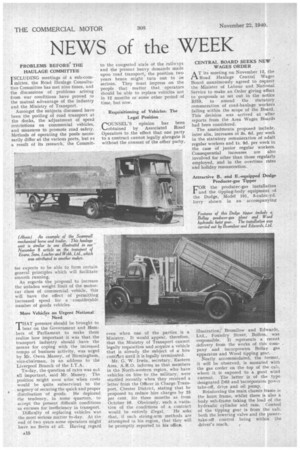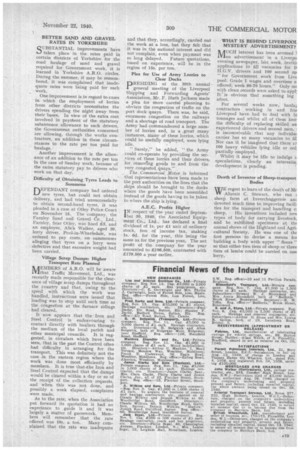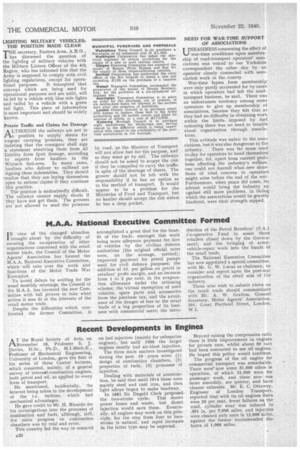NEWS of the WEEK
Page 20

Page 21

Page 22

If you've noticed an error in this article please click here to report it so we can fix it.
PROBLEMS BEFORE' THE HAULAGE COMMITTEE
INCLUDING meetings of a sub-committee, the Road Haulage Consultative Committee has met nine times, and the discussions of problems arising from war conditions have proved to the mutual advantage of the industry and the Ministry of Transport.
Amongst the subjects discussed have been the pooling of road transport at the docks, the adjustment of speed restrictions on commercial vehicles, and measures to promote road safety. Methods of operating the pools necessarily differ at the various ports, but es a result of its research, the Commit.
tee expects to be able to form certain general principles which will facilitate smooth running.
As regards the proposal to increase the unladen weight limit of the motorcar class of commercial vehicle, this will have the effect of permitting increased speed for a considerable number of goods vehicles More Vehicles an Urgent National Need THAT pressure should be brought to I bear on the Government and Members of Parliament to make them realize how important it was that the transport industry should have the means for coping with the increased tempo of business activity, was urged by Mr. Owen Massey, of Birmingham, vice-chairman, in an address to the Liverpool Branch of the I.T.A.
To-clay, the question of rates was not all important, said Mr. Massey. The position might soon arise when costs would be quite subservient to the urgency of securing the quick and proper distribution of goods. He deplored the tendency, in some quarters, to accept the present difficult conditions as excuses for inefficiency in transport.
DifficAlty of replacing vehicles was the most serious matter to-day. At the end of two years some operators might have no fleets at all. Having regard to the congested state of the railways and the present heavy demands made upon road transport, the position two years hence might turn out to be serious. They must impress on the people that matter that operators should be able to replace vehicles not in 12 months or some other period of time, but now.
Requisitioning of Vehicles: The Legal Position
COUNSEL'S opinion has been obtained by Associated Road Operators to the effect that one party to a contract cannot legally abrogate it without the consent of the other party,
even when one of the parties is a Ministry. It would appear, therefore, that the Ministry of Transport cannot legally requisition and acquire a vehicle that is already the subject of a hire cont?act until it is legally terminated.
Mr. G. W. Irwin, secretary, Eastern Area, A.R.O. informs us that members in the North-western region, who have vehicles on hire to the military, were startled recently when they received a letter from the Officer in Charge.Transport, Chester District, stating that he proposed to reduce hire charges by 25 per cent, for three months as from October 16. Obviously, such a variation of the conditions of a contract would be entirely illegal. He asks that, if such strong-arm methods are attempted in his region, that they will be promptly reported to his office. CENTRAL BOARD $EEKS NEW WAGES ORDER
AT its meeting on November 12, the Road Haulage Central Wages Board unanimously agreed to request the Minister of Labour and National Service to make an Order giving effect to proposals as set out in the notice RHO, to amend the statutory remuneration of road-haulage workers falling within the scope of the Board. This decision was arrived at after reports from the Area Wages Boards had been considered.
The amendments proposed include, inter alia, increases of 3s. 6d. per week in the statutory remuneration of adult regular workers and Is. 9d. per week in the case of junior regular workers. Consequential increases are also involved for other than those regularly employed, and in the overtime rates and holiday remuneration.
Attractive B. and E.-equippecl Dodge Producer-gas Tipper
FOR the producer-gas installation and the tipping-body equipment of the Dodge, Model 101, 5-cubic-yd. lorry shown in an accompanying
illustration, Bromilow and Edwards, Ltd., Foundry Street, Bolton, was responsible. It represents a recent delivery from the works of this company and incorporates Bellay gas apparatus and Wood tipping gear.
Neatly accomniodated; the former, it will be observed, is mounted with the gas cooler on the top of the cab, where it is exposed to a good wind current. The latter is of the type designated D63 and incorporates power take-off, drive and oil pump.
Reinforcing the main chassis frame is the hoist frame, whilst there is also a body sub-frame taking the load of the hydraulic cylinder and ram. Control of the tipping gear is from the cab, both the lowering valve and the powertake-off control being within' the driver's reach. , BETTER SAND AND GRAVEL RATES IN YORKSHIRE
SUBSTANTIAL improvements have taken place in the rates paid in certain districts of Yorkshire for the road haulage of sand and gravel required for Government work, it is learned in Yorkshire A.R.O. circles. During the summer, it may be remembered, it was complained that inadequate rates were being paid for such work.
One improvement is in regard to cases in which the employment of lorries from other districts necessitates the drivers spending the night away from their bases. In view of the extra cost involved in payment of the statutory subsistence allowance to such drivers, the Government authorities concerned are allowing, through the works contractors, an addition in these circumstances to the rate per ton paid for haulage.
Another improvement is the allowance of an addition to the rate per ton in the case of Sunday work, because of the extra statutory pay to drivers who work on that day.
Difficulty of Obtaining Tyres Leads to Summons
DEFENDANT company had ordered new tyres, but could not obtain delivery, and had tried unsuccessfully to obtain second-hand tyres, it was pleaded in a case at Otley Police Court on November 15. The company, the Farnley Sand and Gravel Co., Ltd., Farnley, near Otley, was fined £.3, and an employee, Alick Walker, aged 30, lorry driver, Pool-in-Wharfedale, was ordered to pay costs, on summonses alleging that tyres on a lorry were defective and that excessive weight had been carried.
Village Scrap Dumps: Higher Transport Rate Planned l‘fiEMEERS of A.R.O. will be aware althat Traffic Movement, Ltd., was recently made responsible for the clearance of village scrap dumps throughout the country and that, owing to the speed with which the work was handled, instructions were issued that loading was to stop until such time as the congestion at the furnace sidings . had cleared.
It now appears that the Iron and Steel Control is endeavouring to contact directly with hauliers through the medium of the local parish and
other municipal councils. It is suggested, in circulars which have been seen, that in the past the Control often had difficulty in arranging for the transport. This was definitely not the case in the eastern region where the work was done most efficiently by members. It is true that sthe Iron and Steel Control expected that the dumps would be cleared within a day or so of the receipt of the collection requests, and when this was not done, and possibly a week elapsed, complaints were made.
As to the rate; when the Association put forward its quotation it had. no experience to guide it and it was largely a matter of guesswork. Members will remember that the rate
offered was 10s, a ton. Many complained that the rate was inadequate
and that they, accordingly, carried out the work at a loss, but they felt that it was in the national interest and did not complain, even when payment was so long delayed. Future quotations, based on experience, will he in the region of 15s. per ton.
Plea for Use of Army Lorries to Clear Docks
PRESIDING at the 39th annual general meeting of the Liverpool Shipping and Forwarding Agents' Association, Mr. F. Huth Jackson made a plea for more careful pla.nning. to obviate the congestion of traffic on the port dock quays. There was, he said, enormous congestion on the railways and a shortage of road transport. The Army had commandeered a large number of lorries and, in a .great many instances, many of these lorries, which could be usefully employed, were lying idle.
" Surely," he added, "the Army could co-operate by providing the services of these lorries and their drivers for removing goods to and from the very congested quays."
The Commercial gotor is informed that representations have been made to the port authorities on the lines that the ships should be brought to the docks where the goods have been assembled instead of the goods having to be taken to where the ship is lying.
A.E.C. Profits Higher I N respect of the year ended Septem ber 30, 1940, the Associated Equipment Co., Ltd., has declared a final dividend of Is. per RI unit of ordinary stock, free of income tax, making Is. 6d. for the year, this being the same as for the previous year,. The net profit of the company for the year amounted to £196,500, contrasted with £179,500 a year earlier. WHAT IS BEHIND LIVERPOOL MYSTERY ADVERTISEMENT?
AUCH interest has been aroused alan advertisement in a Liverpo evening newspaper, la'st week, invitie applications to fill vacancies for if H.G.V. drivers and 100 second me " for Government work from Live pool: Grade I wages and overtime a offered; week 60-70 hours." Only ria with clean records were asked to appl: It' is obvious that something big
afoot. , For several weeks now, haula contractors working in and f roi Liverpool have had to deal with hi tonnages and whilst all of them kno. the difficulty of replacing skilled an experienced drivers and second men, is inconceivable that any indiviclut carrier has so many vacancies to nl: Nor can it be imagined that there er 100 heavy vehicles lying idle or oril partially employed.
Whilst it may he idle to indulge ii speculations, clearly an in terestin, development is pending.
Death of Inventor of Sheep-transport Bodies
WE. regret to learn of the death of Mr Alistair C. Stewart, who ran a sheep farm at Inverchaggernie ant devoted much time to improving facili. ties for the transport and handling o.
sheep. His inventions included new types of body for carrying livestock, and he exhibited specimens at the annual shows of the Highland and Agri. cultural Society. He was one of the first persons to devise a means for building a body with upper " floors " so that either two tiers of sheep or three tiers of lambs could be carried on one lorry. LIGHTING MILITARY VEHICLES. THE POSITION MADE CLEAR
THE secretary, Eastern Area, A.R.O.,
has discussed the question of the lighting of military vehicles with the Military Liaison Officer of the 4th, Region, who has informed him that the Army is supposed to comply with civil lighting regulations, except for opera tional purposes. It transpired that convoys which are being used for operational purposes and are unlit, will be led by a vehicle with blue side lights and tailed by a vehicle with a green tail light. This piece of information is most important and should be widely known.
Potato Traffic and Claims for Damage
A LTHOUGH the railways are not in ta position to supply sheets for wagons carrying potatoes, they are insisting that the consignor shall sign a statement absolving them fromliability from fi-ost damage, accoring to reports from hauliers in the Wisbech Sub-area. In many cases. hauliers who deliver to railhead are signing these indemnities. They should realize that they are laying themselves open to serious claims if they continue this practice.
The position is undoubtedly difficult. The railways cannot supply sheets if they have not got them, The growers are not allowed to send the potatoes by road, as the Ministry of Transport will not allow fuel for the purpose, and so they must go by rail. The railways should not be asked to accept the risk if they be compelled to carry the traffic in spite of the shortage of sheets. The grower should not be left with the responsibility if he has no option as to the method of transport. It would appear to be a problem for the Ministries of Food and Transport, but no haulier should accept the risk unless he has a deep pocket. NEED FOR WAR-TIME SUPPORT OF ASSOCIATIONS
UNEASINESS concerning the effect of war-time conditions upon membership of road-transport operators' associations was voiced to our Yorkshire correspondent the other day by an operator closely connected with association work in the county.
War-time lapses from membership were only partly accounted for by cases in which operators had left the roadtransport business, he said. There was an unfortunate tendency among some operators to give up membership of associations, because they felt that as they had no difficulty in obtaining work within the limits imposed by fuel rationing there was no need to trouble about organization through associations.
This attitude was unfair to the associations, but it was also dangerous to the industry. There was far more need to-day for operators to band themselves together, for, apart from current problems affecting the industry's welfare, one could not foretell what -new situations of vital concern to operators might arise before the end of the war. Furthermore, when peace did come, its advent would bring the industry up against still more problems, in facing which the associations would be gravely hindered, were their strength sapped.




















































